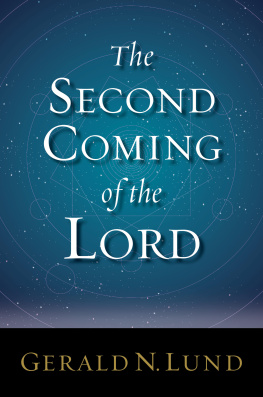Contents
Preface
Our Quest
Most readers of this book will have what we shall call believing hearts. If you purchased this book, or had it given or loaned to you, you are most likely a person who believes (or at least wants to believe) in a loving God who watches over and blesses His children. That belief profoundly affects how you live your life. You want to be good so that your life is pleasing to Him. You seek to exercise faith in Him and believe that when you do that, you are a happier person and will be blessed for doing so.
However, there may be some readers who are not so sure about God and how they relate to Him right now. Some may wonder if He exists at all. Others believe He does, but theyre not sure what kind of God He really is. Some ask why, if there is a God, there is so much suffering in the world. Others may have trusted Him in times past, but when life took one of those hard turns, which it so often does, they cried unto Him, pled with Him to help, even begged Him to intervene, and nothing happened. And so they turned away, their hearts filled with frustration, anger, and doubt.
This book is for any and all who either are now asking or have sometime in the past asked this almost universal question. Janice Kapp Perry, in a wonderful song written for Primary children, captured this deep longing we have in words that speak to all of us: Heavenly Father, are you really there? And do you hear and answer every childs prayer?
Even those with great faith are not immune from these questions. Here are the cries of the Prophet Joseph Smith and of the Redeemer Himself:
O God, where art thou? (D&C 121:1).
My God, my God, why hast thou forsaken me? (Matthew 27:46).
We believe it is a question that can be answered in many ways. And that is the primary purpose of this bookto answer this very simple but heart-wrenching cry for understanding:
WHY ISNT GOD ANSWERING ME?
About This Book
1. This book is narrowly limited in its scope. It is not intended to be a treatise on personal revelation but rather a focus on one particular aspect of revelation: getting answers to our prayers.
2. This book will largely ignore the more obvious reasons why God isnt answering our prayers. It will quickly become apparent that we dont discuss much about the more serious forms of sin and wickedness in this book. We only briefly mention such things as moral cleanliness, marital infidelity, criminal behavior of all kinds, pornography, family neglect, other forms of abuse, and so on. We do this because experience shows that those who are participating in these more serious sins either are not concerned about God and what He thinks of them, do not consider their behavior to be bad, or already know that these more serious sins are why God isnt currently answering their prayers. Our focus, therefore, will be on those things that are not so obvious, things that we may acknowledge as bad habits or human frailties and weaknesses but that we do not necessarily consider to be sinful behavior in the traditional sense. Therefore, we may not even consider them as things that are causing this blockage in getting answers to our prayers.
3. This book is not a call to repentance. The reader may often feel that he or she is being called to repent. That is to be expected. As we talk about some of these less obvious reasons why God doesnt seem to be responding to our prayers, hopefully we will find ourselves wincing inwardly, thinking, Oh dear. Thats me. I am guilty of that one. And when that happens, we dont need someone to tell us to change. Because of our commitment to God, we will naturally try to eliminate those things that block our access to God or more diligently facilitate those things that increase the likelihood of getting answers to our prayers. And that desire to change is called repentance. Think of this book as a pantry of possible answers. When we are feeling a hunger for greater communion with the Spirit, this book can be a pantry where we can find something that will help us satisfy our hunger. Sometimes we find one thing that satisfies us, but on our next visit it may be something else we are looking for. Other times it may take a combination of ingredients. In other words, the purpose of the book is to help us undertake a personal assessment of where we are in our communion with God. If we do that successfully, most readers will call themselves to repentance.
4. This book will not talk a lot about how to fix whatever it is that is causing the blockage of revelation. This may seem like a major oversight, but it will quickly become clear that this is rarely necessary, because once we identify the cause of the blockage, the solution is pretty clear. We either stop doing what is causing the problem or start doing something that will draw us closer to God. It is as simple as that.
5. This book does not provide all possible answers to our question. We will discuss many possible answers to our question, but the complexity of human nature is such that the number of possible answers could run into the hundreds. We could not possibly describe every reason why people arent getting answers to their prayers. But we will try to deal with some of the more common reasons that may be the source of our problem. Asking the Lord, Where do I start? or, What next? is always a good idea, because He does have all the answers.
6. On the surface, some of the answers may seem more trivial than others. Dont be surprised if from time to time you find yourself saying, Really? Something that simple could be whats holding me back? Lehi and his family said something similar when they discovered the Liahona outside Lehis tent. Nephi, however, saw it for what it was when he said, And thus we see that by small means the Lord can bring about great things (1 Nephi 16:29; emphasis added).
7. This book does not need to be read from start to finish. Some readers may choose to browse through the book rather than read it sequentially. Others may start with the table of contents and then go to a chapter that particularly catches their interest. Remember our pantry analogy. Feel free to enter, to look around, and to choose what best satisfies your hunger.
8. The ultimate purpose of this book is to encourage all of us to constantly ask two questions of the Lord. If we remember to always ask two specific questions, miracles can happen: What can I start doing that will increase my ability to receive answers to my prayers? and, What do I need to stop doing because it is hampering my ability to receive answers to my prayers?
As a final note, throughout the book, many quotations have portions that are emphasized through the use of italics. When the emphasis is in the original source, that will be noted. All other times, the emphasis is added by the author.
I
Why? Why? Why?
Chapter 1
O God, Where Art Thou?
If [we] are acquainted with the revelations, there is no questionpersonal or social or political or occupationalthat need go unanswered. Therein is contained the fulness of the everlasting gospel. Therein we find principles of truth that resolve every confusion and every problem and every dilemma that will face the human family or any individual in it.
Boyd K. Packer
The Mind and Will of God
Joseph Smith once made two simple declarations about revelation: We never can comprehend the things of God and of heaven, but by revelation


















